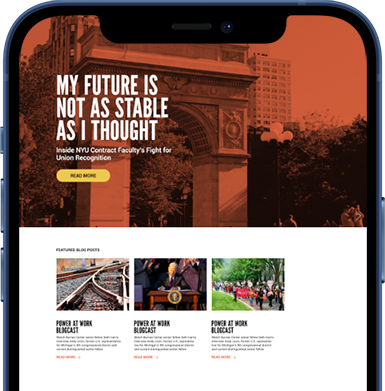All photos by Alexandra Anderson for Power At Work.
On Saturday, April 1st, Northeastern University’s Huskies Organized With Labor (HOWL) hosted their first labor summit. The event showcased the organizing efforts of several campus employee groups and provided a platform for discussion on the future of labor at the university. The summit was convened against the backdrop of several ongoing labor issues at Northeastern, including graduate workers organizing with the United Auto Workers (UAW) and the potential fragmentation of the university’s workforce as Northeastern expands its global footprint.
For many of the panelists, the labor summit marked their first time sharing a space with employees from other worker groups, because they are separated either by geography or their positions at the university. In a sunny conference room on the fourth floor of the Egan Research Center on Northeastern’s Boston campus, representatives of graduate student workers, adjunct faculty, dining hall workers, and Mills College staff came together—some virtually—to share their experiences working, organizing, and bargaining at Northeastern.
Northeastern’s labor practices dominated the night’s discussion as each group of workers shared their struggles with the university.
Panelists from left to right: Nikki Thomas, Hunter Moskowitz, Aaron Block and Melissa Wolter-Gustafson
“Northeastern tries to say that Ph.D students don’t do any work,” said Nikki Thomas, a Ph.D student researcher. “They’re trying to split-up the union by excluding student worker groups.” Northeastern graduate workers have been trying to organize a union with help from the UAW since 2017. Their stated goals are to secure economic stability, improve health care coverage, and establish strong harassment and discrimination protections. Graduate student worker participants in the summit reported facing ongoing retaliation from the university for their organizing efforts.
Another discussion began with the question, “how do we effectively organize workers with different ethnic, national and cultural backgrounds?” Both the dining hall workers and the graduate student workers described encountering this challenge. “We’re currently struggling with this,” said Thomas. “International students worry about their visa status; they worry about what protections they have. Our organizing committee is fairly white… it’s on us to make sure we create a space and community where [international student workers] can trust us and communicate with us.”
The summit allowed both in-person and remote attendance.
“Even though we’re not speaking the same language, we all have the same mindset and we’re all fighting for the same thing,” said Shante McCorvey, a Northeastern dining worker. “We’re all sick and tired of not being known and not being recognized for this work we’re doing,” agreed Gross. “It’s work you do and work you love… it puts food on the table, it provides for your family. Organizing is about having one on one conversations and building worker solidarity. Together we show power.”
The need for worker solidarity was a theme within worker groups, but also spanning Northeastern’s growing number of campuses. David Buuck, the Chief Steward of the Adjunct Faculty Union at Mills College in Oakland, California, shared the disorientation faculty have experienced since Northeastern acquired the college in 2022.
“Mills has been as bad as you can imagine; just top-down decision making with no educational merit,” he said. “Some random person in Boston said we can’t have arts programs if they weren’t STEM based… our arts professors were thinking ‘well, what are we supposed to teach?’”
After-panel discussion with worker representatives, HOWL members and summit attendees
With Northeastern’s expansion continuing, some panelists shared their concern that the university’s growth will create a grim outlook for worker power within an ever-larger institution. The university recently shared “Northeastern 2025,” an academic plan that focuses on global, remote learning. “Their idea is a decentralized, multi-national corporation,” said Aaron Block, a teaching professor at Northeastern. “It will be very easy to erode against these [union] gains and turn it into a fragmented, depowered labor force.”
The idea of a largely remote workforce harkened back to the early days of the pandemic when a lack of in-person connection presented organizing difficulties. “It’s important to understand that a union is a community, working together and organizing together,” said Hunter Moskowitz, a graduate student worker. “The most effective organizing happens face-to-face, and the pandemic presented that challenge.”
For adjunct faculty, however, the widespread implementation of remote meeting tools actually helped facilitate organizing. “There are a lot of adjuncts who have no centralized space… that’s historically been one of our biggest challenges in organizing,” said Melissa Wolter-Gustafson, a part-time lecturer at Northeastern. “With the cost of parking being what it is, coming in-person can be a hard ask. Zoom has been amazingly helpful.”
McCorvey agreed; “Organizing with Zoom meetings, there’s no reason you can’t make a meeting. Your organizing is only as good as your numbers.”
HOWL’s labor summit provided a first opportunity for worker representatives, HOWL members, and other attendees to begin the discussion about worker solidarity and worker power at Northeastern. The question still to be answered is how the unions, organizers, workers and students will seek to build on this productive set of conversations.

